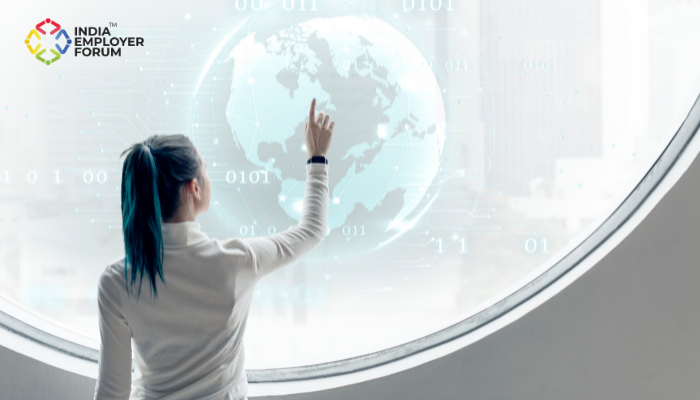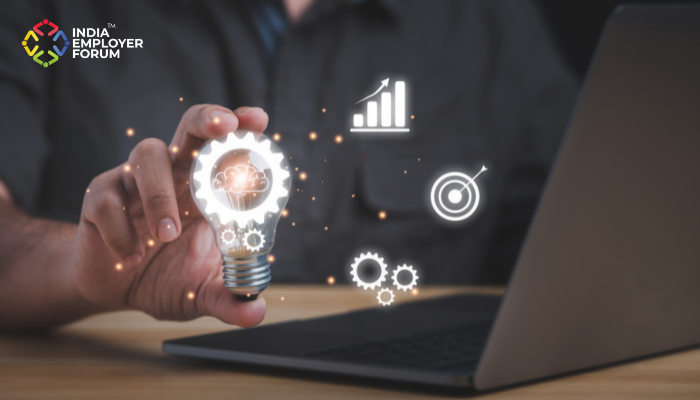With high-speed calculation, huge amounts of data and advanced algorithms, artificial intelligence has become a big part of how organizations function by bringing accuracy and stability into everyday business processes. While, use of artificial intelligence in HR is relatively new, it can contribute immensely in refining various HR functions such as talent acquisition, payroll and accessing policies and procedures.
In the recent years, organizations that have adopted AI in HR, have seen the following benefits:
- Enhanced Candidate Experience: By using artificial intelligence in HRM, organizations have seen significant, measurable and immediate results in delivering an enhanced candidate experience that is seamless and intuitive. Regardless of the volume of candidates, timely and relevant correspondence can be ensured by incorporating AI in HR analytics. It keeps the candidates engaged and prevents them from falling out of the loop.
- Enhanced Employee Experience: AI can also help in creating a more personalized employee experience especially during the employee onboarding process. Conversational AI in HR, can help new employees obtain answers to most common queries quickly and can also lead them to training modules, contact lists and business conduct guidelines. This helps in creating a positive employee experience and ensuring that they are prepared for the role in no time. Employees can also get easy access to their personal information like emergency contacts, leaves available, status of leave requests or any other authorized data that they might need.
- Ease of Access to Information: Incorporating artificial intelligence in HR can also help the managers access information about their team members through chatbot and perform HR transactions easily. The managers, then, do not have to visit the core HR system for daily transactional HR tasks. Simply by asking chatbots, they can access authorized employee data like job history, performance rating, KPIs etc.
- Automate/ Replace Administrative Tasks: Using artificial intelligence in human resource management can help in automating repetitive tasks like sourcing resumes, scheduling interviews and providing feedback. It allows recruiters and HR managers to focus more on strategic work like engaging with top talent, creating personalized interview experiences and establishing reward and mentoring programs. Using artificial intelligence in HR can actually improve human experience since increased efficiency allows the HR personnel more time for quality interactions.
- Team Training: AI can make skill gap assessment easier, thus, helping team managers to plan digital training opportunities better. AI in HR can also help managers and teams to track their progress in training programs, thus, making it more effective.
- Reduce Bias: One of the most significant impacts of artificial intelligence on human resource management is that it can be set up to reduce bias in recruitment with the help of an algorithm assessment platform. It helps in creating a diverse pool of qualified candidates by tapping into multiple sources, providing improved insights into candidate profiles and making more informed hiring decisions.
You might also be interested to read: Get A Head-start On HR Trends 2020 – Maximize Performance By Reimagining Human Resources
While the importance of artificial intelligence in HR is undeniable, the adoption has been rather slow. While the financial barrier is largely responsible for it, there are other key barriers like lack of skilled people, concern over privacy and data security and maintenance cost. While organizations have been collecting data to make better predictions for future behavior, HR teams are lagging behind in using AI in HR analytics for improved manpower planning.
Over years, a strong digital IQ can also help businesses delve deeper into the “unconscious levels” of information. AI can help in analyzing people’s statements, their moods and intentions on social media and other sources which can then be used to simulate human behavior. This can assist in substantiating employee experience on a day to day basis along with predicting and reducing employee attrition. Overall, smart people analytics can help in finding the right mix of human and machine in the workplace, identifying the skills and talents required to create a balance and find the best candidates through internal and external hiring processes.
One of the main challenges towards use of artificial intelligence in HR is HR data privacy. While setting up AI processes, it is extremely important to be aware of employee data protection and have proper governance procedures in place that addresses the legal and ethical issues as well. Organizations must get the required consent to ensure that individuals know that their data is being collected and there is no adverse effect on employee trust. It can be done by providing a privacy notice to the employees explaining to them what data is being collected and why it is required.
IT security departments should also have clear policies in place stating what data is permissible and what isn’t to collect for the AI solution. Any personal identifiable information (PII) or confidential information should be communicated via a secure connection and must not be stored in a chatbot solution while processing any employee request. Training data should not have any confidential or personal identifiable information and must be secure for machine learning purposes. Organizations need to ensure that they have appropriate controls in place to keep the HR data safe. HR systems should only reveal authorized information to employees during conversational AI transactions.
You might also be interested to read: Artificial Intelligence In HR Elevates The Human Touch – Delivering Accurate Results The Smart Way
It is extremely important that before rushing into adopting the new technology, organizations are aware of the implications of using artificial intelligence in HR and plan it with caution. They must gain appropriate insight and understand the prerequisite to manage AI systems effectively and efficiently. The AI environment is not the same as other IT environments and requires different skills, mindsets and methodologies.Using artificial intelligence in HR can go a long way in raising employee experience, reducing time spent on transactional tasks and help HR professionals focus more on strategic HR management. However, it can work effectively only when it is designed with a purpose and as a fit to the organizational culture. Also, since employees will be affected by the AI function in multiple ways, it is extremely important to focus on employee needs and train them appropriately to get the best possible outcome.
References:
- The New Age: Artificial Intelligence for Human Resource Opportunities and Functions- EY, 2018
- Ten HR Trends In The Age Of Artificial Intelligence- Jeanne Meister, 08 January, 2019
- 11 Ways AI can Revolutionize Human Resources- Forbes Human Resources Council, 09 July, 2018
Related Topics:




